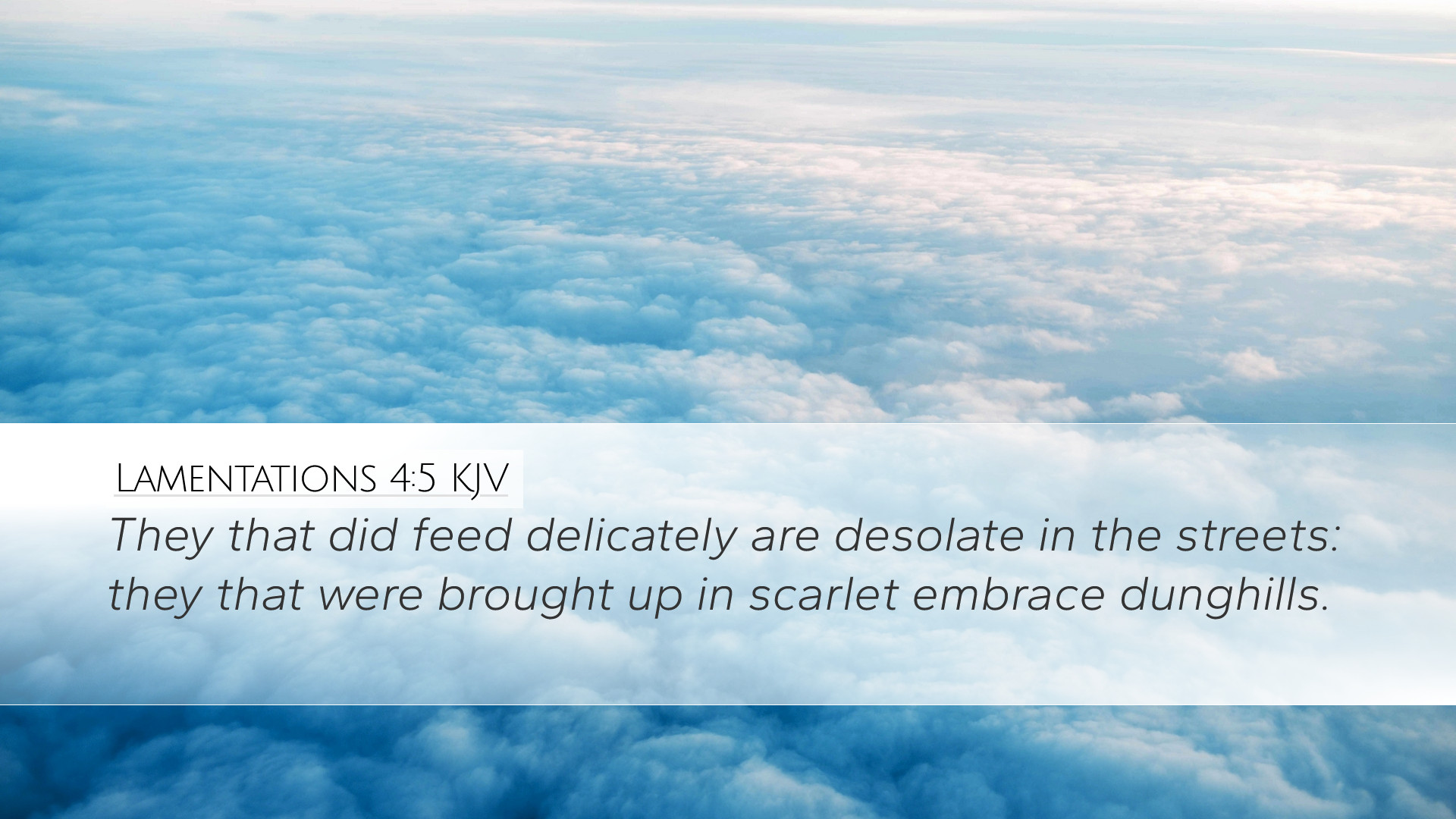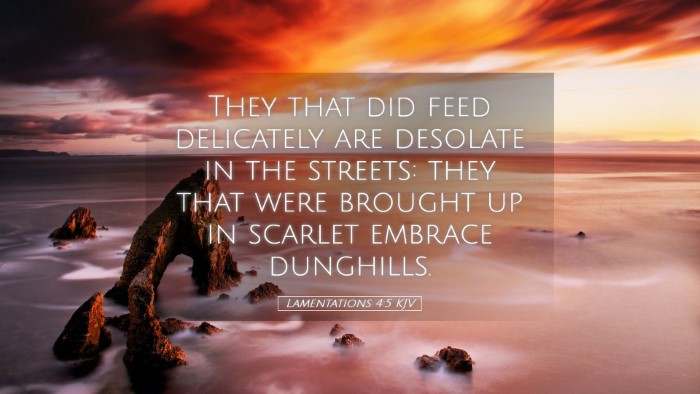Lamentations 4:5 - Commentary and Insights
Lamentations 4:5 states:
"They that did feed delicately are desolate in the streets: they that were brought up in scarlet embrace dunghills."
This poignant verse serves as a stark reminder of the reversal of fortune that Jerusalem experienced during the Babylonian siege. The chapter reflects the deep sorrow and devastation that befell the people of Judah, and within this context, this verse highlights the tragic consequences of sin and social decline.
Overview of the Verse
Lamentations is a collection of poetic laments over the destruction of Jerusalem. Chapter 4 particularly focuses on the horrors experienced by the populace, emphasizing the contrasts between their past prosperity and current suffering. The verse uses vivid imagery to paint a picture of nobility and wealth reduced to utter despair.
Thematic Elements
-
Destruction of Social Classes:
In Hebrew society, those who were well-fed and lived delicately represented the elite. The contrast presented in this verse starkly portrays their degradation. Albert Barnes notes that “the rich and the aristocratic, once accustomed to luxury, now find themselves utterly destitute, wandering the streets.”
-
Transition from Abundance to Scarcity:
This verse highlights the loss of societal structure, where those once sheltered in luxury are now exposed to disgrace. Matthew Henry articulates that “the very ones who once dined warmly are now left to rummage through refuse.”
-
The Symbolism of Scarlet:
Scarlet represents both wealth and significance; those who were “brought up in scarlet” had access to luxury and prestige. Adam Clarke explains that “the vibrant symbol of their former glory is now a forgotten memory, as they embrace the filth of desperation.”
Historical Context
The backdrop of Lamentations provides crucial insight into why such a lamentation was penned. Following the fall of Jerusalem, the people faced not only physical hunger but a profound spiritual desolation.
The once-powerful leaders and individuals, having ignored God’s commandments, are suffering the consequences of their actions. Clarke emphasizes that “the Hebrew people were divinely warned through prophets, but their obstinacy led to their downfall.”
Applying the Text
Pastors and theologians can draw several applications from this text:
-
Awareness of Consequences:
It cautions against the complacency that can come with wealth and social status. Reflecting on this verse, contemporary leaders should ponder the potential consequences of pride and moral failure.
-
Empathy towards the Suffering:
The verse invokes a deep sense of empathy for those in distress. It encourages congregations to remember and provide support for the needy, as the elite once enjoyed abundance.
-
Reminder of Transience:
The fleeting nature of wealth and status is a core lesson. As articulated by Barnes, “the destinies of men are continuously modified by their relationship with God; only His grace can reverse their fate.”
Theological Implications
This lamentation gives rise to significant theological reflections. It prompts questions about divine justice and mercy, and whether God permits suffering as a form of discipline or consequence:
-
Divine Justice:
The suffering of these individuals serves as a testament to God’s justice and retribution against sin. Clarke mentions, “this serves as a warning that God’s judgments are not arbitrary but are always in line with natural law and moral order.”
-
Hope amidst Despair:
Despite the bleak circumstances, the text is set within a larger framework of hope in restoration. Lamentations recalls the faithfulness of God and the potential for redemption, though it may require profound humility and repentance from His people.
Conclusion
Lamentations 4:5 serves as a powerful reminder of the reality of sin’s consequences and the stark juxtaposition of privilege and desolation. It calls for introspection for all believers, urging them to consider their standing before God.
In this verse, we find vivid imagery that can educate and inspire sermons, discussions, and studies on the nature of God's dealings with humanity. As we reflect on its message, may it serve as a catalyst for compassion, humility, and a deeper understanding of divine justice and mercy.


